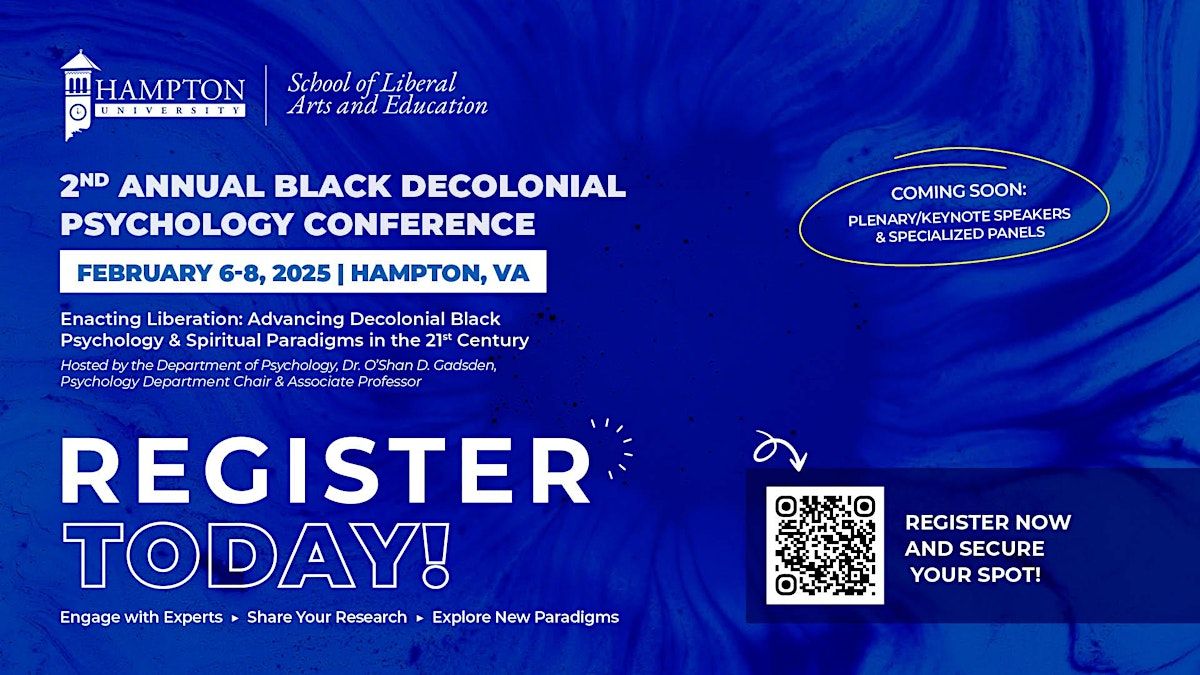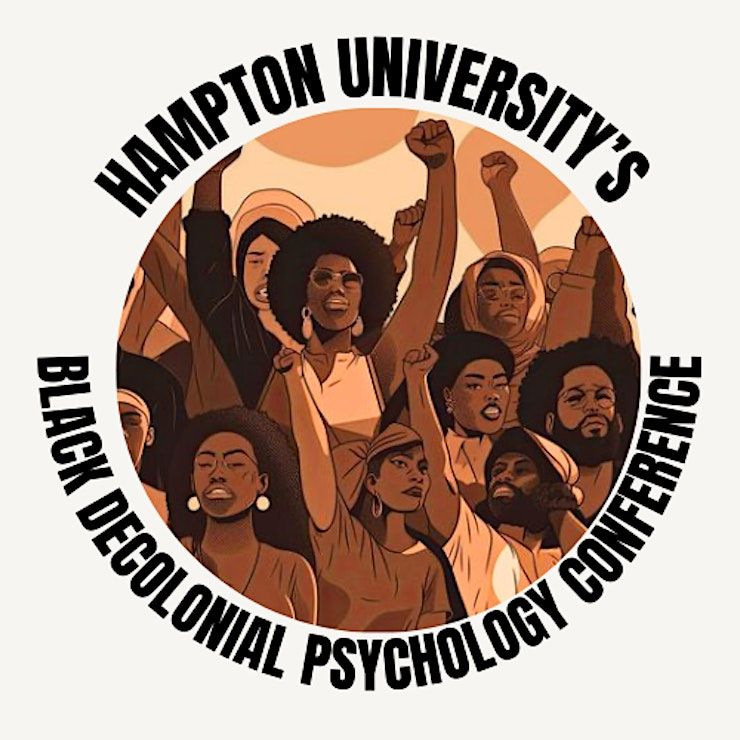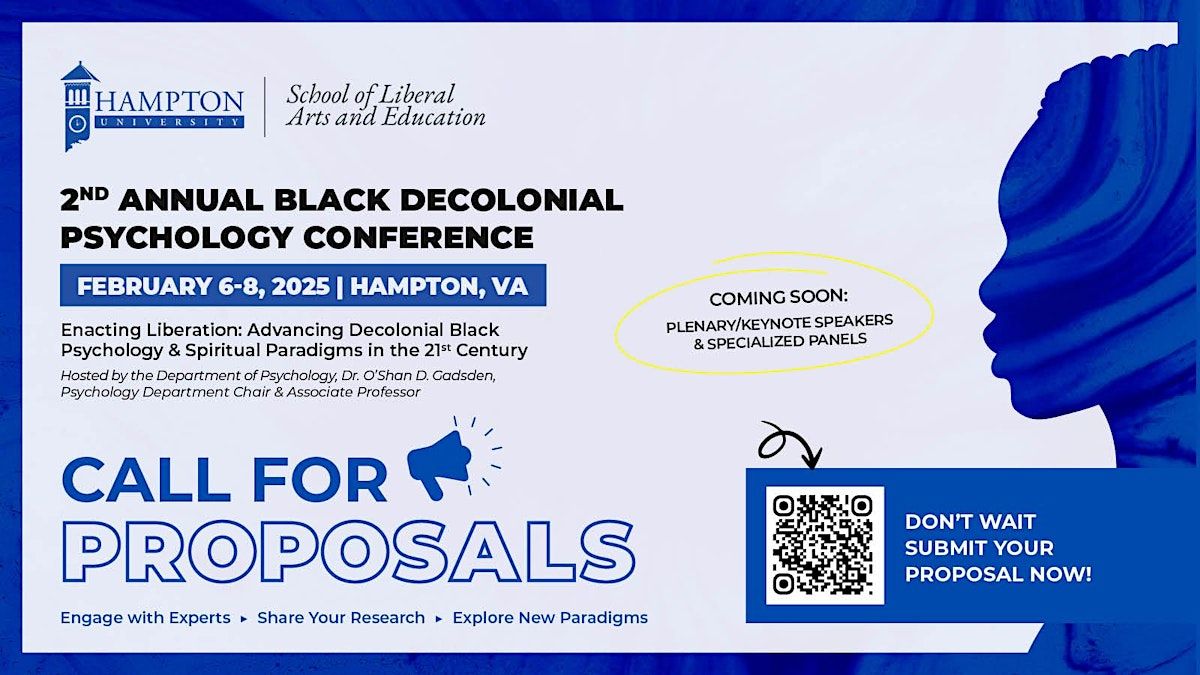2nd Annual Hampton University Black Decolonizing Psychology Conference
Schedule
Thu, 06 Feb, 2025 at 11:00 am to Sat, 08 Feb, 2025 at 07:00 pm
UTC-05:00Location
Student Center Hampton University | Hampton, VA

About this Event
Welcome to the 2nd Annual Hampton University Black Decolonizing Psychology Conference! We've been gone for a minute but we're back in the jump! Building upon the success of last year's conference, The Psychology Department (under the leadership of the School of Liberal Arts & Education) is thrilled to announce our 2nd Annual Black Decolonial Psychology Conference scheduled to take place February 6th-8th, 2025.
This year’s theme is, “Enacting Liberation: Advancing Decolonial Black Psychology & Spiritual Paradigms in the 21st Century.” This year's conference will be a much larger and more robust gathering, featuring diverse perspectives from researchers, clinicians, spiritual and community practitioners, and students from all over the world.
We are inviting you to join us in creating a space of intellectual-spiritual curiosity, reconciliation, and healing for Black individuals and communities globally. You don't want to miss the plethora of psycho-spiritual theory/knowledge/scholarship and experiential learning (e.g., symposiums, interactive workshops, paper presentations, poster presentations, and fireside chats) that will take place during this 3-day event.
Come and learn about: The Confluence of Mind, Culture, and Spirit in Trauma and Recovery; Breaking Chains, Healing Souls: Pioneering Decolonial Practices in Applied Psychology; Roots and Resilience: Community-Based Healing and Socio-Political Empowerment; Visionaries of Change: Evolving Pedagogies and Decolonial Black- Centered Research Frameworks AND so much more!
And to top if all off, this year we will have a Karaoke & Kicks Afterparty (21-up) off campus as an ending celebration.
So you don't want to miss this packed full event!
We are providing a pre-registration rate that will be good until 12/15/24. It includes access to the conference on all 3 days. You can even purchase tickets for particular days if your schedule doesn't allow you to attend all three days of the conference programming. Please note, the Karaoke & Kicks Afterparty is not included in the registration fee.
Please register using the link below or the QR code on the flyer:
If you have any questions, feel free to contact:
Conference email:
Dr. O’Shan D. Gadsden, PhD
Associate Professor & Department Chair
Conference Chair & Host
Department of Psychology, Hampton University
MLK Hall, Suite 238
Phone: 757-727-5301
Email: [email protected]
Dr. Vanessa Goodar, PhD
Assistant Professor
Conference Co-Chair
Department of Psychology, Hampton University
Email: [email protected]
Can't wait to see you in the place. Ase! ODG



Call for Proposals:
We invite researchers, clinicians, spiritual and community practitioners, community members, nonprofit organizations, and students from around the globe to submit abstracts for presentations in the following formats: symposiums, paper presentations, poster presentations, and fireside chats.
We seek proposals that address the following themed tracks:
Track One: The Confluence of Mind, Culture, and Spirit in Trauma and Recovery
We invite proposals that shed light on the intricate interplay of mind, culture, and spirit in trauma and recovery. As such, proposals for this track should focus on providing conference participants with contemporary research and theories that highlight the complex and nuanced nature of this confluence while also shedding light on how resilience interfaces with and/or serves as a protective factor for managing and navigating trauma and recovery. We are especially interested in decolonial and non-traditional definitions of culture and spirit and the ways in which spirit can be utilized as a protective factor in healing psychological-emotional traumas within diverse cultural and spiritual contexts. Subtopics of interest include:
● The neuro-psycho-cultural-spiritual dimensions of trauma: How do these intersecting factors shape individuals' (i.e., marginalized, minoritized populations- of particular interest are populations across the African diaspora) experiences and responses to trauma?
● Psycho-cultural risk factors and resilience: What cultural and spiritual resources contribute to resilience in the face of trauma with marginalized, minoritized populations (of particular interest are populations across the African diaspora). How can these resources be leveraged in therapeutic settings?
We seek innovative (i.e., decolonial, Black centered) research and practice-based insights/paradigms that deepen our understanding of trauma and resilience.
Track Two: Breaking Chains, Healing Souls: Pioneering Decolonial Practices in Applied Psychology
Join us in forging new paths towards liberation and healing through pioneering decolonial practices in applied psychology. This track invites proposals that explore:
- The ways in which the field of psychology and mental health are currently colonial and imperial in nature and its negative impacts on individuals across the African diaspora and indigenous populations.
- Contemporary Decolonial and Black centered theories of personality and theoretical orientations that inform clinical assessment and treatment.
- Innovative strategies and interventions aimed at psycho-cultural-spiritual liberation and the decolonization of therapeutic practices, particularly within Black-centered trauma interventions.
We seek submissions that address the following subthemes:
● Strategies for psycho-cultural-spiritual liberation: How can psychology intersect with cultural and spiritual practices to empower individuals across the African diaspora and indigenous communities?
● Contemporary Decolonial and Black centered therapeutic practices and interventions: What novel approaches can challenge colonial legacies within therapeutic settings and promote culturally responsive care for individuals across the African diaspora and indigenous communities?
● Decolonial, Black-centered trauma interventions and strategies: How can trauma interventions be tailored to honor and address the unique experiences and histories of Black/indigenous individuals and communities?
Proposals should offer insights, clear methodologies/interventions, and outcomes that contribute to advancing decolonial and Black centered perspectives within applied psychology and the mental health field at large. We encourage submissions that understand that theory and praxis are synonymous and not dualistic in nature. We also seek submissions that prioritize the voices and needs of marginalized communities to collectively break chains and heal souls by reimagining and innovating the future of applied psychology and the mental health field at large.
Track Three: Roots and Resilience: Community-Based Healing and Socio-Political Empowerment
Track three explores the intersections of community-based healing practices and socio-political empowerment in our quest to nurture roots of resistance and resilience. This track invites proposals that delve into innovative approaches and impactful initiatives addressing:
● Community-based healing practices: How can non-traditional and homeopathic healing methods empower African communities across the diaspora and indigenous populations?
● Socio-political issues: What strategies and interventions effectively integrate healing practices with socio-political resistance and advocacy to empower African communities across the diaspora and indigenous populations?
We encourage submissions that showcase collaborative efforts, grassroots initiatives, and transformative projects aimed at fostering resilience and promoting social justice. Proposals should demonstrate a clear commitment to community engagement, cultural responsiveness, and the promotion of equity and inclusion. Join us in celebrating the rich tapestry of community-based healing and socio-political empowerment to cultivate roots of resilience and empower African communities across the diaspora and indigenous populations towards a future of collective healing and empowerment.
Track Four: Visionaries of Change: Evolving Pedagogies and Decolonial Black- Centered Research Frameworks
Join us in shaping the future of academia as we explore evolving liberatory pedagogies and decolonial Black-centered research frameworks. This track invites proposals that resist the boundaries of traditional education and research paradigms. Our sub-themes for this track are:
● Teaching pedagogies:
1. What are some contemporary decolonial and innovative teaching methods and approaches?
2. How can decolonial and innovative teaching methods and approaches foster inclusive-collaborative learning environments and empower students to engage reflexively with critical theories and decolonial thought?
3. How can the instructors create learning environments that are spiritual and healing in nature while promoting intellectual development?
● Black-centered decolonial research frameworks:
1. What is Black-centered and decolonial research?
2. How can B;ack-centered and decolonial research amplify marginalized voices, challenge colonial narratives, and center Black needs, lived experiences, and perspectives in research?
We seek proposals that showcase transformative practices in teaching and research, emphasizing collaboration, inclusivity, and social justice. Submissions should highlight practical applications, theoretical contributions, and multiple types of outcomes that advance decolonial agendas within academic settings. Let's embark on a journey of transformation and empowerment through visionary teaching and research paving the way for a more equitable and inclusive educational landscape.
Conference Presentation Formats*
Interactive Workshop: Engaging session where participants actively participate in activities, discussions, and exercises designed to explore specific topics or skills (90 minutes).
Symposiums: Structured session featuring multiple presenters who discuss related research or topics under a central theme, offering diverse perspectives and insights (90 minutes)
Paper Presentations: Formal presentations where authors present their research findings, theories, or methodologies to an audience, typically followed by a Q&A session (90 minutes)
Poster Presentations: Visual display of research findings or projects, usually in a concise and
visual format, allowing for informal discussions with attendees (60 minutes).
Fireside Chat: Informal and conversational session where experts or leaders engage in an open dialogue about relevant topics, offering insights and reflections in a relaxed setting (90 minutes).
*Please Note:
Each abstract proposal must focus on only one conference track (Track One, Track Two, Track Three, or Track Four).
Additionally, each author may not present in a format more than once (interactive workshop, symposium, paper presentation, poster presentation, or fireside chat) to ensure diverse participation and content dissemination.
Submission Guidelines:
- Abstract Length: 250-300 words (single-spaced)
-Submission Deadline: October 5th, 2024 @11:59PM
-Notification of Acceptance: December 1st, 2024
All presenters much register!
How to Submit:
Conference Abstract Proposal Submission Link:
See you soon! Ase!
Where is it happening?
Student Center Hampton University, 700 Emancipation Drive, Hampton, United StatesEvent Location & Nearby Stays:
USD 17.85 to USD 161.90













